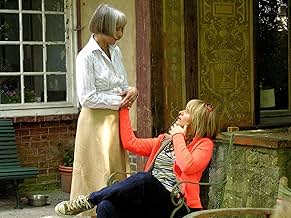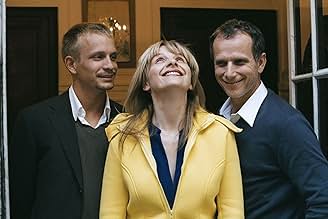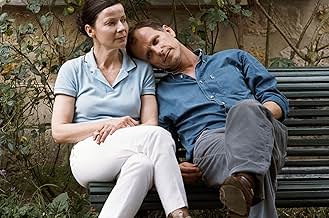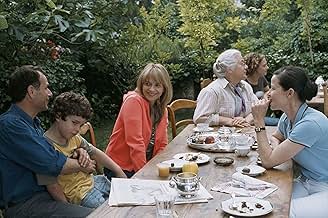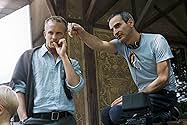AVALIAÇÃO DA IMDb
7,1/10
8,4 mil
SUA AVALIAÇÃO
Adicionar um enredo no seu idiomaTwo brothers and a sister witness the disappearance of their childhood memories when they must relinquish the family belongings to ensure their deceased mother's succession.Two brothers and a sister witness the disappearance of their childhood memories when they must relinquish the family belongings to ensure their deceased mother's succession.Two brothers and a sister witness the disappearance of their childhood memories when they must relinquish the family belongings to ensure their deceased mother's succession.
- Direção
- Roteirista
- Artistas
- Prêmios
- 9 vitórias e 23 indicações no total
Avaliações em destaque
Hélène Berthier, niece of a famous painter, receive her children and grand children for her birthday, and take this opportunity to talk about her death, and what will happen to her uncle's collection. Once dead, Frederic, her elder son think that they'll keep the house as it his, but his brother and sister don't live in France anymore and think that it would more intelligent to sell. When I was expecting the family to be destroyed around this heritage, nothing like that happens, they all accept and the rarity in the 21 century of families having things that could belong to museums takes an end. This film is extremely beautiful, for many reasons. First because it can touch everyone who lost someone and saw what was theirs, being sold and put in many places. Then this film is beautiful because it shows also how everyone accepts that but also suffers from what they can't keep together: family, past, heritage! To me it shows better than any Amelie, or La Vie en Rose what being French means: being thorn between the heritage of a culture and an appeal of modernity, wanting to keep your roots alive and spread toward the world. This is funny how this thought came through my mind "Why do they want to live in Beijing or New York?" suddenly being in the film, that seemed weird to me when I just lived two years and a half in London, and probably won't stay in my old country forever. The actors are great, Edith Scob playing the extremely classy Hélène, and Charles Berling, Jeremy Regnier and Juliette Binoche are very touching and human. It's important to say, that the object are also characters in this story, and it's scary at the end to see them in the museum d'Orsay, how they lost life or are recovering some. It's important to say that this film was a project with the museum, and I think that it is brilliant to make us pay attention to the details of these objects when generally we're not. Question: is art made for museum or to live with it? People wouldn't try to steal them from museum if the answer was museums
If you want to see my other critics: http://www.silverparticules.blogspot.com
Up until now, you may have seen films that are told through the eyes of a specific character, a child or even a dog. However this film achieves the impossible, it tells the story of generations through the eyes of the objects! The film opens with a large family gathering in a gorgeous old house located in French countryside. The house lies in the middle of a large garden and hosts beautiful antique furniture the owner, mother of three middle aged children, inherited from her uncle. A year later, she dies and the children have to decide about the fate of the house and the furniture.
Anyone who has lost a parent or an elder family member possibly has gone through these difficulties depicted so naturally in the film. However, the movie goes beyond the initial thoughts and feelings. Delicate questions asked by this movie are multifaceted and explore the effects of capitalist globalization on generations.
Those objects have memories in them. When they are left to a museum, they seemingly belong to the society as whole but to no one at the same time.
The elder brother, professor of economy, who lives in France wants to preserve the house, he wants to stick to his roots, to family memories but his brother and sister want to follow their careers in China and US. Yes, by doing so they live in the moment and yes, they are not confined to France and yes, the whole world is theirs but they are also left with nothing. Like objects displayed in the museum.
And this duality lives on until the ironic ending, which can be interpreted as optimistic or pessimistic by viewers even tough pessimistic tone is definitely more prevalent.
Beautiful acting by Binoche, Charles Berling, Edith Scob and wonderful directing and writing by Assayas. This movie is just lifelike, simple but complex!
Anyone who has lost a parent or an elder family member possibly has gone through these difficulties depicted so naturally in the film. However, the movie goes beyond the initial thoughts and feelings. Delicate questions asked by this movie are multifaceted and explore the effects of capitalist globalization on generations.
Those objects have memories in them. When they are left to a museum, they seemingly belong to the society as whole but to no one at the same time.
The elder brother, professor of economy, who lives in France wants to preserve the house, he wants to stick to his roots, to family memories but his brother and sister want to follow their careers in China and US. Yes, by doing so they live in the moment and yes, they are not confined to France and yes, the whole world is theirs but they are also left with nothing. Like objects displayed in the museum.
And this duality lives on until the ironic ending, which can be interpreted as optimistic or pessimistic by viewers even tough pessimistic tone is definitely more prevalent.
Beautiful acting by Binoche, Charles Berling, Edith Scob and wonderful directing and writing by Assayas. This movie is just lifelike, simple but complex!
Three adult siblings must decide what to do with their mother's house and collection of valuable art after her death in this melancholy but quite lovely film from Olivier Assayas.
"Summer Hours" really struck a chord with me, because I've just recently begun to see the results of aging in my own parents and am beginning in a real rather than abstract way to prepare myself for a time when I will not have them in my life. The film does wonders at conveying this particular family dynamic with very few moments of outright exposition; the first scene especially, a family gathering while the mother is still alive and wants to inform her children about what to do with her things when she passes, is a marvel of subtle nuances in both the writing and acting that clearly communicates the differences in the relationships between the mother and her three children. The oldest brother doesn't want to think about his mother's death in advance and wants to hold on to things after she's gone; the two younger children, living in different parts of the world, want to be rid of things as quickly and cleanly as possible. Yet the movie doesn't pass judgement on any of them, doesn't treat the oldest brother as a sentimental fool, nor the younger siblings as callously indifferent. It simply acknowledges the complexity of emotions involved in dealing with inanimate objects that represent years of a flesh-and-blood relationship.
Grade: A
"Summer Hours" really struck a chord with me, because I've just recently begun to see the results of aging in my own parents and am beginning in a real rather than abstract way to prepare myself for a time when I will not have them in my life. The film does wonders at conveying this particular family dynamic with very few moments of outright exposition; the first scene especially, a family gathering while the mother is still alive and wants to inform her children about what to do with her things when she passes, is a marvel of subtle nuances in both the writing and acting that clearly communicates the differences in the relationships between the mother and her three children. The oldest brother doesn't want to think about his mother's death in advance and wants to hold on to things after she's gone; the two younger children, living in different parts of the world, want to be rid of things as quickly and cleanly as possible. Yet the movie doesn't pass judgement on any of them, doesn't treat the oldest brother as a sentimental fool, nor the younger siblings as callously indifferent. It simply acknowledges the complexity of emotions involved in dealing with inanimate objects that represent years of a flesh-and-blood relationship.
Grade: A
My only previous Assayas' approach is Maggie Cheung's Cannes BEST ACTRESS nabbing feature CLEAN (2004, 7/10), and for most Chinese media, Assayas seems to alway been in an ill-fated personage as Maggie's ex-husband. But his works matures splendidly with finesse and sobriety (from CLEAN to SUMMER HOURS), the latter resounds a similar pace of meditation and quietude as Hirokazu Koreeda's STILL WALKING (2008, 8/10), tackles with a slice of family life, with a contemplation towards the domestic heredity, globalized opportunism, alienated generations and art conservation.
In dealing with a sentimental demise of a bourgeoisie matriarch, who resides in a suburban villa near Paris with all her uncle's art menagerie and his worthwhile sketching books (apparently he was a renowned painter himself and an unspeakable family secret), Assayas infills an indefatigable stamina to keep all the delicate matters in a civil restraint, the contradiction abounds among three siblings in regard to keep or sell the villa; and the proceedings of donating valuable art pieces has also been a bumpy road; for the elder son, he also has teenage children to worry about, and last but not the least, his abiding remembrance of the past is the most poignant blow to one who can fit into his shoes under the circumstances.
The show has never been slid into a thespians' melodrama notwithstanding the fact that its indulgence of a top-billing Gallic cast, a blonde Binoche incarnates a very light-touch casualness as the metropolitan daughter, living in USA and dedicates herself more in bringing the work of art abroad for the international exposure; Renier, the younger son, finds both an opportunity in settling down in China and an exigent situation in which the profit of selling the villa couldn't come as timely as possible. While these two are soon-to-be-goners, without a pinch yearning for their homeland, the liability all falls on the elder brother (Berling), whose true-to-life embodiment of his character anchors the film's backbone in a concrete formality, it is a prickly situation will come about to anyone eventually. Edith Scob, as the deceased mother, whose first 30-minutes appearance contrives to establish herself as an indomitable shadow encroached by the past, when she is gone, something else will be taken with her together and forever, Scob is pitch perfect in her role's demanding of the physical infirmity, an unswerving mind of knowing her time is up and the duty as a bequeather.
I have not conceal my preference to this quiet, reflective lifelike imitation than other more grandstanding razzle-dazzle, it is a simple film with a concise message delivered eloquently by the mastery of Assayas who auspiciously shoulders on the privilege of an auteur not only in the French terrain, but also as an international landmark, like many of his precedent compatriots.
In dealing with a sentimental demise of a bourgeoisie matriarch, who resides in a suburban villa near Paris with all her uncle's art menagerie and his worthwhile sketching books (apparently he was a renowned painter himself and an unspeakable family secret), Assayas infills an indefatigable stamina to keep all the delicate matters in a civil restraint, the contradiction abounds among three siblings in regard to keep or sell the villa; and the proceedings of donating valuable art pieces has also been a bumpy road; for the elder son, he also has teenage children to worry about, and last but not the least, his abiding remembrance of the past is the most poignant blow to one who can fit into his shoes under the circumstances.
The show has never been slid into a thespians' melodrama notwithstanding the fact that its indulgence of a top-billing Gallic cast, a blonde Binoche incarnates a very light-touch casualness as the metropolitan daughter, living in USA and dedicates herself more in bringing the work of art abroad for the international exposure; Renier, the younger son, finds both an opportunity in settling down in China and an exigent situation in which the profit of selling the villa couldn't come as timely as possible. While these two are soon-to-be-goners, without a pinch yearning for their homeland, the liability all falls on the elder brother (Berling), whose true-to-life embodiment of his character anchors the film's backbone in a concrete formality, it is a prickly situation will come about to anyone eventually. Edith Scob, as the deceased mother, whose first 30-minutes appearance contrives to establish herself as an indomitable shadow encroached by the past, when she is gone, something else will be taken with her together and forever, Scob is pitch perfect in her role's demanding of the physical infirmity, an unswerving mind of knowing her time is up and the duty as a bequeather.
I have not conceal my preference to this quiet, reflective lifelike imitation than other more grandstanding razzle-dazzle, it is a simple film with a concise message delivered eloquently by the mastery of Assayas who auspiciously shoulders on the privilege of an auteur not only in the French terrain, but also as an international landmark, like many of his precedent compatriots.
Hélène is the matriarch of an extended scattered family. She lives in the country outside of Paris where she has kept valuable art from a famous artist uncle. She has two sons and a daughter. The family gathers for her 75th birthday but at the end of the day, everybody leaves. The family has worked to keep the artist's legacy including a new art book and a world tour where Hélène does talks. Later, she passes and the family has to deal with the inheritance. The eldest Frédéric Marly wants to preserve the home. Adrienne (Juliette Binoche) is a famous designer in NYC. Jérémie is in China as a supervisor in a shoe company. They have to come to terms with the lost of their treasured memories.
It's French. It's talky. It's sincerely adult. It's family. When the siblings are all in one place, there is a feeling of a real family talking in a real way. The movie can drift from scene to scene. There is one standout among the third generation. She closes the movie in a profound scene. It's a family film in the truest sense.
It's French. It's talky. It's sincerely adult. It's family. When the siblings are all in one place, there is a feeling of a real family talking in a real way. The movie can drift from scene to scene. There is one standout among the third generation. She closes the movie in a profound scene. It's a family film in the truest sense.
Você sabia?
- CuriosidadesThis film is part of the Criterion Collection, spine #513.
- Erros de gravaçãoGrandmother's two most valuable objects, the Corots, are hung where they'll both get lots of sunlight, guaranteed to damage the colors. Since once gets the definite impression that little in the house has changed over many years, these pictures would be toast by now.
- Trilhas sonorasLoftus Jones
Written by Turlough O'Carolan
Performed by Robin Williamson, Mat Maneri and Barre Phillips
Principais escolhas
Faça login para avaliar e ver a lista de recomendações personalizadas
- How long is Summer Hours?Fornecido pela Alexa
Detalhes
- Data de lançamento
- País de origem
- Centrais de atendimento oficiais
- Idiomas
- Também conhecido como
- Summer Hours
- Locações de filme
- La Saglière, 8 Rue de Parmain, Butry-sur-Oise, Val-d'Oise, França(the Berthiers' house)
- Empresas de produção
- Consulte mais créditos da empresa na IMDbPro
Bilheteria
- Orçamento
- € 4.400.000 (estimativa)
- Faturamento bruto nos EUA e Canadá
- US$ 1.657.001
- Fim de semana de estreia nos EUA e Canadá
- US$ 49.484
- 17 de mai. de 2009
- Faturamento bruto mundial
- US$ 7.835.857
- Tempo de duração1 hora 43 minutos
- Cor
- Mixagem de som
- Proporção
- 1.85 : 1
Contribua para esta página
Sugerir uma alteração ou adicionar conteúdo ausente

Principal brecha
By what name was Horas de Verão (2008) officially released in India in English?
Responda







